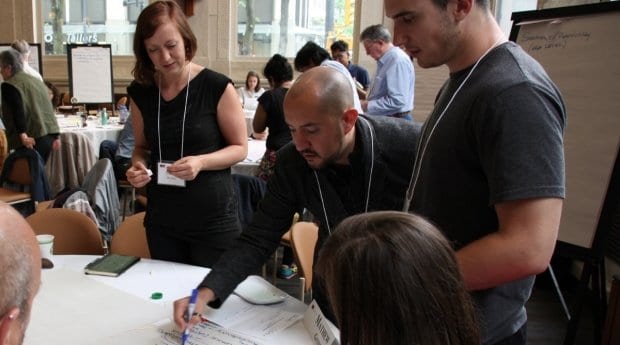Inclusivity is a top priority for Vancouver’s LGBT community when it comes to creating a new facility for Qmunity. That was one of the chief messages emerging May 27 from participants at the Building Qmunity consultation.
The all-day event, hosted by Simon Fraser University’s Centre for Dialogue, brought together approximately 120 community members and stakeholders, kicking off three months of consultation on the future community centre. Keynote speaker Maura Lawless, executive director of Toronto’s LGBT community centre The 519, opened the day by sharing the history and current context of her organization and its 2,300-square-metre building.
However, the event’s primary focus was not Qmunity’s future facility itself but rather the needs and priorities of the LGBT community, and how these needs will inform Qmunity’s services and programs going into a new location.
“Something that was really interesting that came out of our group discussion was the idea that [the centre] needs to be a space that’s inclusive to everyone, and that includes especially the most marginalized people in our community. So indigenous people, two-spirit people, youth, elders,” says Nikki Zawadzki, one of the event’s group facilitators and also a member of the Qmunity building advisory committee.
Throughout the day, participants were divided into small groups and asked to discuss topics such as community values and future needs. While these discussions brought out a number of recurring themes — such as the importance of flexible, multi-use space; transparency; technological outreach; advocacy; and support for both youth and seniors — the need for inclusivity seemed to be articulated most of all.
“One of the things that we talked a lot about was ‘Who doesn’t have a seat at the table today?’ Because there’s only so many folks that have the luxury of devoting an entire day on a Wednesday to come,” Zawadski says.
Dara Parker, executive director of Qmunity, acknowledged this issue during her opening remarks, noting that the day’s activity was only one way the broader LGBT community will be engaged during this consultation process.
“We’re also doing smaller group dialogues and they’re not going to be during the day. They’re going to be evenings and/or weekends so we can access folks who couldn’t take a full day off,” she said.
These smaller sessions will specifically target the groups that Zawadski and other participants recognized as typically marginalized and in need of conscious inclusion.
Qmunity has also launched a needs assessment survey on its website which will be online through the three-month consultation period.
“This was a very deliberate design process,” Parker tells Daily Xtra. “We spent over a year designing this process. And we hired an external facilitator to do it.”
This external facilitator is the SFU Centre for Dialogue, which Parker says brings “neutrality, transparency, and also additional capacity” to the consultation on Qmunity’s future space.
Mark Winston, a professor and senior fellow at the Centre for Dialogue, says that diversity within the LGBT community can make inclusion challenging and only underscores the need for a thorough consultative process.
“We want to get this right and we want to really make sure that nobody feels like they’re left outside the tent,” he says.
Jazz Skold, a two-spirit and queer person of colour who uses the pronoun they, echoes this sentiment and says they were mostly satisfied with how the day went.
“I think with any of these community things, when you’re inviting a wider community and you’re not tokenizing anybody, you’re going to have intergenerational clashes, as well as just community trying to understand each other, even on a basic level,” they say.
“So even when we’re sitting at the same table, sometimes there can be this gross discomfort. We can’t all come under an umbrella like Qmunity and all be present and accounted for if we don’t have these conversations. It’s better, even though it can be tense at times.”
The Centre for Dialogue will collate and analyze the feedback gathered from the May 27 event, using it (along with information from the upcoming smaller dialogue sessions and the online survey) to produce a report with recommendations for programming at Qmunity’s new centre. This report will be released early in 2016.
To take the Qmunity needs assessment survey click here.

 Why you can trust Xtra
Why you can trust Xtra


